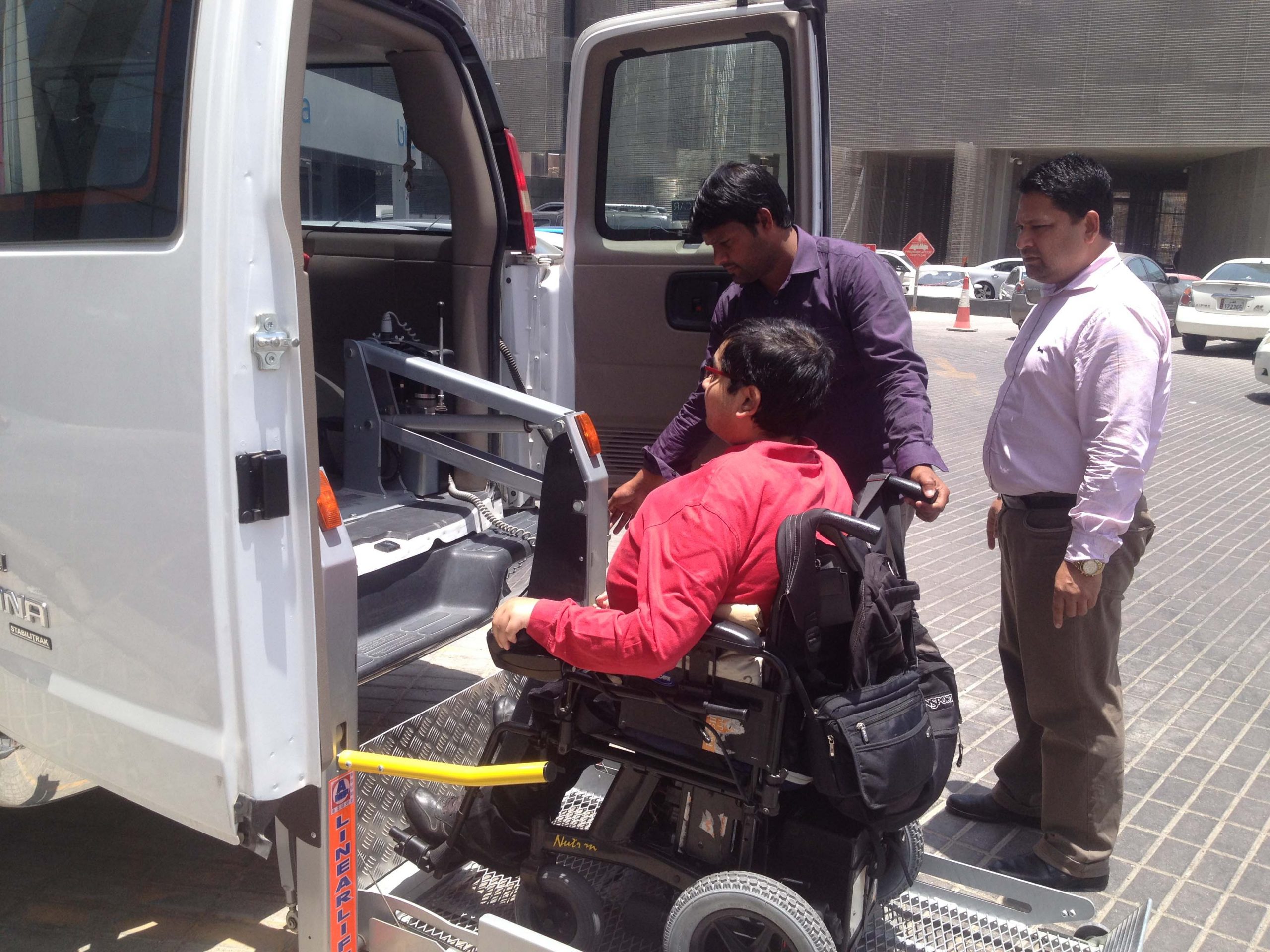
Getting around Qatar can be challenging at the best of times, but for wheelchair users, it can be especially daunting.
To help tackle transportation problems faced by people with disabilities, one Qatar resident has recently helped launch the country’s first handicap-accessible limousine service.
Ibticar, the Arabic word for “innovation,” is the brainchild of Anirban Lahiri, 32, who was born and raised in Qatar.

Lahiri has muscular dystrophy and uses a wheelchair to get around. Speaking to Doha News, he said navigating Qatar can be quite frustrating, as there are very few accessible transport options.
A few specialist taxis do operate under Mowasalat’s Karwa brand, but Lahiri said he found them to be unreliable, as when he calls to make a reservation, there are often no suitable cars available.
The lack of options can be particularly problematic during emergencies. Lahiri said that several years ago, his mother was hospitalized.
His brother Ari, who also uses a wheelchair, wanted to visit her but it took him several days before he could arrange some form of accessible transport.
“This lack of inclusiveness simply means we aren’t able to travel. It is hurtful on various levels. The inability to travel is frustrating personally and emotionally,” Lahiri told Doha News.
Pilot launch
The entrepreneur, who graduated with a computer science degree from Carnegie Mellon University in Qatar, said that his inability to find a reliable, specialized transport service in Qatar encouraged him to set up his own company.

A year ago, he began Ibticar on a pilot basis. After several successful trials, he is now on a quest to further expand the current fleet of two adapted vehicles.
Passengers who wish to use the service can call 3335 2245 to reserve a car. While the rates are slightly more than a standard limousine service, Lahiri said he has tried to keep prices affordable.
A single journey up to 7km within Doha costs QR60. The adapted cars can also be used on an hourly rate for QR125, or for an airport pickup (QR150).
Each of the vehicles, including a GMC Savana van, cost around QR250,000 to buy and suitably adapt to conform with the standards set by the American Disability Act. Features include an electric lift and advanced lock-down mechanisms to safely secure a wheelchair.
One of the vehicles has space for two wheelchairs, and also has seats for other accompanying passengers.
“It’s important also to accommodate people traveling with the wheelchair user. This is about inclusiveness – that means a whole family can travel together safely,” Lahiri said.

In addition, Ibticar’s drivers have been trained to work with people with mobility issues.
“All our staff are specialized. They know how to interact with people with disabilities, how to safely load and secure a wheelchair into the car, the particular needs of different disabilities, including a blind person, and what they should do in an emergency,” Lahiri added.
In its pilot phase, the service has been operating on a word-of-mouth basis, and has attracted “decent demand” from the community, he said.
Now, Lahiri would like to expand the fleet to four or five cars, and is looking for collaboration with private investors to help fund the project.
“Imagine never being able to know if you are going to be able to get somewhere because you don’t know if you can get a car.
As a wheelchair user, having a reliable transport service gives you more independence and improves your quality of life. As Qatar’s population expands, and more visitors come, there will be an increasing demand for this kind of service,” Lahiri added.
Wider accessibility
The development of a reliable, accessible taxi service would bring Qatar one step closer to better understanding the needs of people with disabilities here, Lahiri said.
Local laws make it illegal to discriminate against people with disabilities, but there are no practical guidelines on how to enforce this.
So while some buildings now have ramps built to access their main entrance, often these are too steep for people in wheelchairs to safely use.
“The infrastructure here needs to improve. There need to be more services that cater to people with special needs,” Lahiri said.
Earlier this year, at the Definitely Able conference in Doha, experts said one of Qatar’s challenges was to improve its accessibility.

“As a city we must ensure all activities are accessible. A city with connectivity denies opportunities to all population,” said Nick Tyler, Chadwick Professor of Civil Engineering, University College London, as quoted by the Peninsula.
This is being taken into account in the design of the stadiums for the World Cup, which will be wheelchair accessible, Mark Dyer from the Supreme Committee of Delivery and Legacy (SC) said.
The Ministry of Municipality and Urban Planning (MMUP) has also previously said it is working on a plan to improve accessibility in Qatar by 2016, but has not provided any public updates about its progress to date.
Thoughts?







